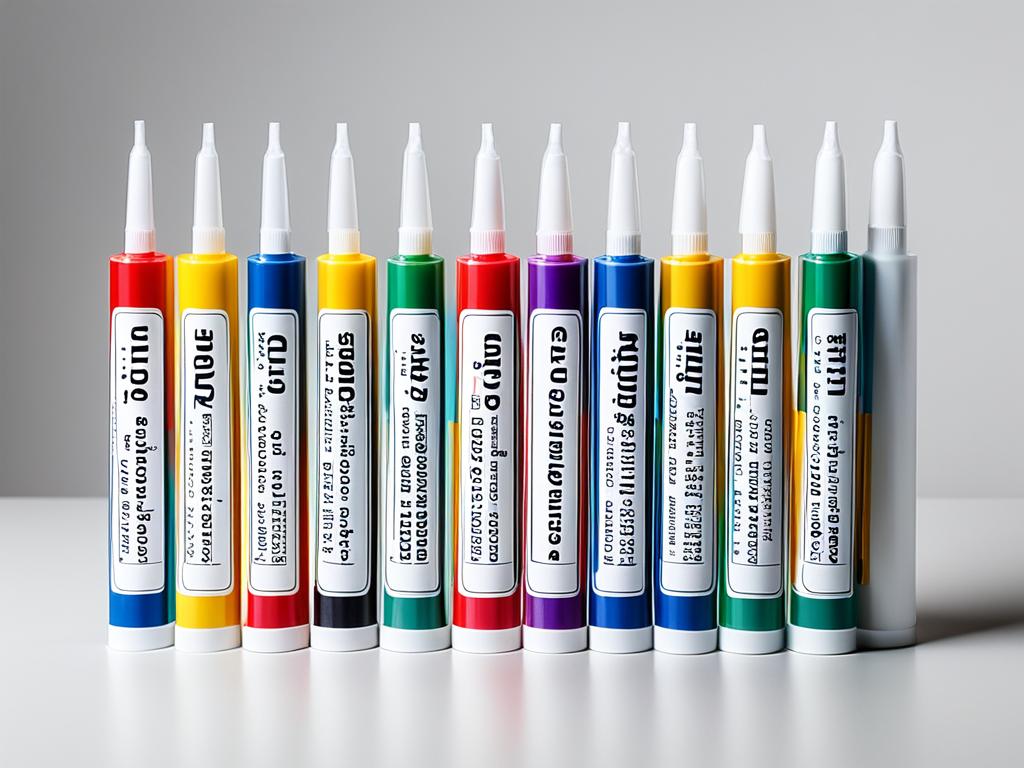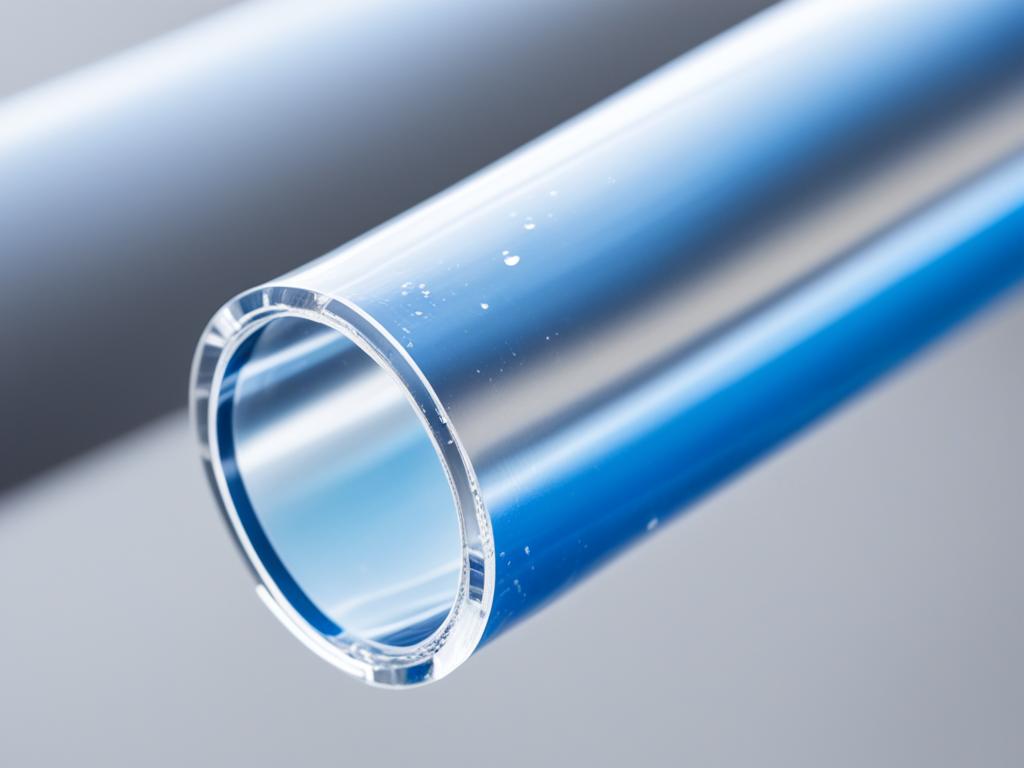When it comes to installing and repairing PVC pipes, choosing the right materials is crucial. PVC glue, also known as PVC cement or solvent cement, is used to create strong and leak-free pipe connections. It is important to use the correct type of PVC glue for high-pressure or low-pressure applications. In addition, using PVC primer before applying the glue can enhance bonding and ensure a secure connection. Understanding the different types of PVC glue and their pressure ratings is essential for selecting the best option for your specific plumbing needs.
Key Takeaways:
- PVC glue is essential for creating strong and leak-free pipe connections.
- Using the correct type of PVC glue for your project is important, considering the pressure requirements.
- Using PVC primer before applying the glue can enhance bonding and secure connections.
- Thicker-bodied PVC glue is recommended for high-pressure applications.
- Consult professionals for electrical and plumbing work to ensure safety.
What is PVC Glue Used For?
PVC glue, also known as PVC pipe glue or PVC cement cleaner, is a versatile adhesive used for various plumbing applications. This strong bonding agent is commonly used to fix leaks, fill small gaps, and join PVC pipes and fittings securely.
When it comes to plumbing projects, choosing the right type of PVC glue is essential for optimal results. There are different varieties of PVC glue available, each designed for specific conditions and pressure ratings. It is crucial to select the appropriate PVC glue that suits your project requirements.
While some minor plumbing tasks can be done by beginners, using PVC glue requires expertise and should be carried out by professionals. Safety measures should always be taken when handling PVC primer and solvents, including wearing protective equipment and working quickly to achieve the best bond.
To achieve a successful PVC pipe connection, it is recommended to follow these steps:
- Clean the PVC surfaces to be glued using a PVC cleaner or primer to remove any dirt, dust, or debris.
- Apply a thin layer of PVC glue onto both surfaces that need to be joined.
- Quickly push the PVC pipes or fittings together, ensuring a tight and secure fit.
- Hold the pipes or fittings in place for a few seconds to allow the glue to set.
- Leave the glued connection undisturbed for the recommended drying time provided by the manufacturer.
PVC glue offers a reliable solution for various plumbing needs, providing strong and durable connections. However, it is important to note that PVC glue is not suitable for all applications. It is always recommended to consult with professionals for electrical and plumbing work to ensure safety and compliance with local codes and regulations.
Benefits of PVC Glue:
“Using PVC glue for plumbing projects offers several advantages, including:
- Secure and leak-free connections
- Resistant to water, chemicals, and pressure
- Durable and long-lasting bond
- Easy to apply and use
- Wide range of applicability for various plumbing tasks”
PVC Glue Safety Tips:
“When working with PVC glue, remember to:
- Wear appropriate protective gear, such as gloves and safety goggles, to prevent skin and eye irritation.
- Work in a well-ventilated area to avoid inhaling fumes.
- Follow the instructions provided by the manufacturer for proper handling and application.
- Store PVC glue and primer in a cool, dry place, away from direct sunlight and heat sources.”
| Type of PVC Glue | Pressure Rating | Recommended Applications |
|---|---|---|
| Type N Cement | Low | Non-plumbing projects or pipes with low water pressure |
| Type P Cement (Heavy-Bodied Cement) | Medium to High | Regular home repairs and pressure applications |
Understanding the pressure rating of PVC glue is important for selecting the right adhesive for your specific plumbing needs. Thicker-bodied PVC glue is suitable for high-pressure applications, while thinner options are recommended for low-pressure tasks.
Types of PVC Glue (PVC Cement)
When it comes to PVC pipe installations, selecting the right type of PVC glue is crucial to ensure strong and reliable connections. There are different types of PVC glue available, each designed for specific applications and pressure requirements. Understanding the different options and their pressure ratings can help you choose the best PVC glue for your project.
For non-plumbing projects or pipes with low water pressure, thinner PVC glue options or Type N Cement are suitable choices. However, it is important to note that these should not be used for high-pressure water flow.
For regular home repairs and applications that require pressure resistance, heavy-bodied cement or Type P cement is recommended. While this type of PVC glue may dry slower, it provides superior bonding and joining. It is ideal for creating secure connections in high-pressure plumbing systems.
In addition to considering the type of PVC glue, it is important to take the pressure rating into account. The pressure rating of PVC glue depends on the size of the PVC pipe and the specific pressure requirements. Thicker-bodied PVC glue should be used for high-pressure applications, while thinner options are suitable for low-pressure applications.
When working with high-pressure applications, using PVC primer in conjunction with PVC glue is highly recommended. PVC primer helps prepare the PVC surface for bonding and enhances the strength of the connection.
PVC Glue Types and Pressure Ratings:
| Type | Pressure Rating |
|---|---|
| Type N Cement (Thinner glue) | Low pressure applications |
| Type P Cement (Heavy-bodied glue) | High pressure applications |

By understanding the different types of PVC glue and their pressure ratings, you can make an informed decision when choosing the right adhesive for your PVC pipe projects. Always follow the manufacturer’s instructions and safety guidelines for optimal results.
Conclusion
In conclusion, PVC cleaner and primer are crucial elements in ensuring strong and durable pipe connections. When it comes to bonding PVC pipes, PVC glue is the go-to option due to its exceptional performance. However, for non-plumbing projects, alternatives are available. It is important to compare different PVC cleaners to find the one that best suits your needs.
Understanding the pressure rating of PVC glue is essential for selecting the right type for your specific application. Follow safety precautions when working with PVC primer and solvents to protect yourself. The drying and curing time of PVC glue may vary, so it is important to check the instructions provided by the manufacturer to achieve optimal results.
It is worth noting that while PVC cement can cure underwater, the specific product chosen and the conditions may affect the curing time. While PVC glue is recommended for bonding PVC pipes, it is always advisable to consult professionals for electrical and plumbing work to ensure safety.
FAQ
What is the difference between PVC cleaner and primer?
What is the best PVC cleaner for pipes?
What is the best PVC primer for pipes?
Can I use PVC cleaner instead of primer?
How do I apply PVC cleaner and primer?
Can I use PVC glue without primer?
How long does PVC glue take to dry?
Can PVC glue cure underwater?
Are there alternatives to PVC glue for non-plumbing projects?
Source Links
- https://terrylove.com/forums/index.php?threads/plumber-not-using-purple-primer.34444/
- https://makezine.com/article/science/make-projects-permanently-stain-p/
- https://www.hillsirrigation.com.au/choosing-the-right-pvc-glue-low-high-pressure-applications/
